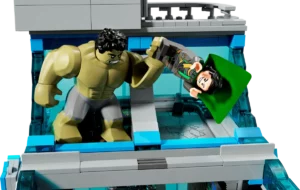
There’s a moment in The Dark Knight which not only feels like a really good comic book scene, but actually transcends it, and becomes better than most of the Batman comics there have been. It’s when The Joker visits Harvey Dent at his hospital bed, and says just the right things to take advantage of Harvey’s broken mind. Everything about that scene is great for long-time fans, not least because of the way it uses well-known characters, but actually reinvents them and ties their fates together.
There are a few scenes like that in The Dark Knight Rises, and this sets it apart from most comic book movies. With most, there’s a sense that if they manage to come pretty close to the comic book at some point, that’s a good thing. One of the most impressive things about Christopher Nolan’s trilogy is that no matter how grittily he portrays the characters, tech and locations, it never loses sight of what’s been best about the comic books themselves. This movie draws mostly from the mid-late nineties run, with elements of the ‘Knightfall’ story as well as a lot of ‘No Man’s Land’.
But, more so than the comics themselves for 95% of the time, the film deals with consequences. Following the end of the previous movie, Bruce has effectively retired, his body shattered from the accumulated damage of crime-fighting and his reputation even more so. In some ways, he’s looking to return, but in other ways, he’s given up. One of the reasons he can’t ignore the events that take place in this film, though, is that in a direct way, he’s responsible for what’s happening. Again, the events of the first two films aren’t just distant memories – they directly inform what’s happening in this one.
This allows for a larger scope to be taken with Batman than has really been taken before – there’s not much need to introduce characters, as we already know the main ones. This frees Nolan up to push the character into somewhat unexplored territory (certainly filmically, and for most of the comics history as well).
This also means that Christian Bale is front-and-centre in this movie, with more interesting things to do than he’s had in a while. Anyone who has seen The Machinist knows that Bale can play withdrawn and haunted like few others, and he plays Bruce as such a recluse in the early parts of the film that it’s difficult to see how he can end up donning the costume again.
Tom Hardy plays Bane as Batman’s threatening shadow, with a huge arrogance to go along with his brutality. He’s bordering on camp at times, but is a hugely fun villain, if (and stop me if you’ve heard this one) somewhat incomprehensible at times.
Meanwhile, Anne Hathaway wins over a huge amount of her nay-sayers with a confident, winning performance, which combines sexiness with pragmatism. The slow build to her appearance in full costume means that the character never feels as ludicrous as she really should – a trick that Nolan also used with Batman in the first film.
Joseph Gordon-Levitt continues his slow climb towards the a-list, with a strong performance in a role that gets a lot to do, but never feels completely fleshed out. Marion Cotillard is charismatic, but probably would have benefitted from more screen-time to flesh out her character.
Meanwhile, if you liked Gary Oldman and Michael Caine in the first two films, you’re probably going to like them here. Caine gets to be emotional, and Oldman gets to be angry and frustrated, and otherwise, they’re continuing doing what they’ve been doing so far in the series.
The film looks amazing, as is to be expected from a movie from Christopher Nolan (especially with Wally Pfister behind the camera), and while Hans Zimmer’s score can be a little overbearing at times, it continues the huge quality of the series so far.
This isn’t to say that the film doesn’t have its flaws. There are continuity issues and plot points that it seems jaw-dropping that they’ve been missed. There are actions that happen purely to advance the plot, and there are a couple of scenes that end up feeling like a cop-out.
However, your mileage will vary on this. You may find that the flaws in it irritate you too much, or you may find they’re something you barely notice. For this reviewer, there’s a scene involving a trial that perfectly displays the kind of comic book movie that nobody thought we’d ever get. And this means that the positives outweigh the negatives completely, and while the flaws irritate, they don’t destroy.



